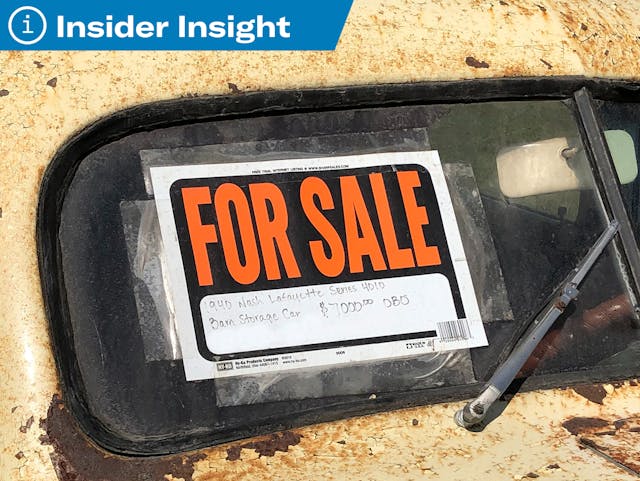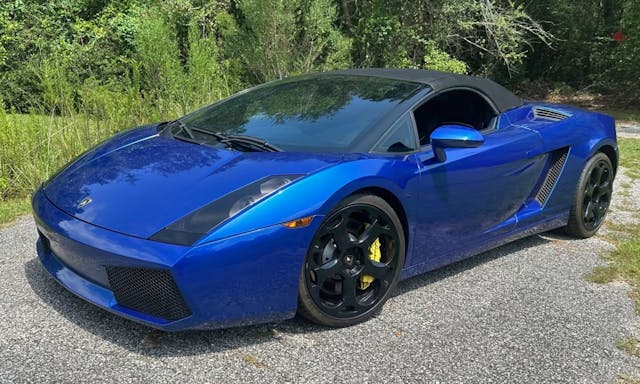Media | Articles
5 pro tips to navigate a slow market

In addition to benefitting from a trove of data, Hagerty Insider also relies heavily on the expertise of veteran market watchers, including Dave Kinney, appraiser and publisher of Hagerty Price Guide. In this column, he will answer often-asked questions about collector car values and buying and selling.
Though Dave can’t put a value on an individual car in this column (that’s what people pay him to do in his appraisal business, after all), he can field questions about the appraisal process, how to go about buying and selling classics, and the industry as a whole. Have a question of your own for a future article? Ask in the comments section.
What to do in a slow market?
Question: I’m more than a little worried about the state of the collector car market. I see that the numbers are way down for the Monterey sales in 2023. Is this a good time to sell, or should I hang on?
DK: A number of people have asked me this, as well as similar question: “Is this a good time to buy?”
On our recent “Hagerty’s No Reserve” podcasts, Larry Webster and I have been talking about Autumn 2023 as a buying season, while pointing out more than a handful of good buys that we’ve seen in the marketplace recently. In reality, good buys are everywhere right now, maybe on a car or truck you’ve been looking for.
Just for the record here, yes, the numbers were down for the auctions when totaled in Monterey from the year before, despite more cars on offer. But, to put things in context, 2022 was a record year. In fact, 2023 was the second-highest sales year in Monterey, ever. And the longest promised recession in known history? Economists tend to agree it’s not here… at least not yet.
This is where things tend to get tricky. With higher interest rates (which, in reality is more like a return to “regular” rates we have lived with for years) some segments of the collector car markets are seeing weakness. Last year at around this time, bargains were very few and far between. Today, it only takes a glance at recent auction offerings to find deals. Doing research for our last podcast, it didn’t take me long at all to find a 92,500-mile 2005 Porsche Cayenne that sold for $5500 (Mecum Chattanooga), a 1986 Nissan Skyline GTS-X for $6825 (Bring-a-Trailer), a 1995 Nissan Pajero Mini VR-II 4X4 (with U.S. title) that only brought $4700 (Cars&Bids), and my personal favorite, a 22,000-mile 2007 Lamborghini Gallardo Spyder that changed garages for $85,800 (back to Mecum Chattanooga for this one).

We have gone over some of this before, but here are a few personal tips I have picked up over the years:
- Think outside the box, and don’t be afraid to get out of your comfort zone. I talk to buyers and sellers all the time, and I know there are some people who refuse to buy from dealers or auction houses. Part of the problem with this is that it limits your potential choices. I’m happy to tell you that I’ve scored great deals from auctions, dealers, and private individuals alike. This might surprise you, but I prefer buying from auctions and dealers more than from private owners. The time I have wasted looking at cars that were grossly misrepresented, had serious paperwork issues, or clueless sellers is, well, laughable. With dealers and auction houses, not so much.
- Go and look at the car with your own eyes, if at all possible. I covered a lot of this in the most recent Ask an Appraiser column, and should you decide to read or re-read that article, check the comment section out as well. There’s a lot of good advice in there that I didn’t cover.
- Don’t just shop for the car. Look at the seller, too. My friend and fellow Hagerty contributor Rob Sass and I have an inside joke. “If you are buying a Porsche that has a Porsche Club of America sticker on one side or the rear window, and an Airline Pilots Association of America sticker on the other corner, you can assume the car is a good one.” Why? Simple. Pilots know about the importance of preventative maintenance, because lives might depend on it. That PCA sticker means they are enthusiasts who at the very least read about their cars, but also probably know sources for parts, tech tips, and things to watch out for. As for dealers and auction houses (or auction platforms) if you get bad vibes, just leave. It can be that simple.
- Buy the best you can afford, unless you have the skills and time to do the work yourself.
- Deals are like trains. There’s another one coming down the tracks. Wait for the right one.
As for what to do in the current, soft-looking market, the advice is mostly the same as with anything you buy or sell, be it stocks or real estate or Beanie Babies. Don’t panic. Don’t sell something you want to keep unless circumstances force you to do so. The flip side of that coin is that you should never buy anything just because it’s currently cheaper than it used to be.
Collector cars are made to be enjoyed, not traded on a whim. So far this year I have sold one car and bought another. Next year for me it looks like it might be the same.
Everyone’s results will vary, but if you have some spare time on your hands this upcoming colder weather season, and if there is a type or kind of car you have been thinking about buying, I suggest you start shopping soon.
***
Marketplace
Buy and sell classics with confidence
Check out the Hagerty Media homepage so you don’t miss a single story, or better yet, bookmark it. To get our best stories delivered right to your inbox, subscribe to our newsletters.











I agree with much here and none of this has to do with a slow market. These are things to practice all the time.
I always preach to buy the best car you can afford as the better car will always be a better value. Too often the fixer upper is never as good and if it is often more invested.
Look in person but bring extra eyes. A neutral buddy can often see things you may miss in the heat of the moment.
Finally never buy on emotion. Unless you are buying a one of one car there are more and you just need to wait for the right one.
A good car deal be so satisfying but one that goes bad can be the car from hell. Many collector cars fall into one or the other.
Emotions really create much of the trouble and the other is the lack of knowledge on some purchases.
I was not well versed in C5 Corvettes till I went to buy one and I in a course of few days loaded up on info of what to buy and not to buy or what to look for. There was tons of good videos and even books that cover this. A few nights investment helped me get a good start and I just kept adding to my knowledge. Also a few good Corvette friends were good teachers.
Be smart when dealing and it just takes some common sense.
As stated above if something looks wrong walk away.
Also do not only look at the car but get it in the air and get under it. This is where many miss the warning problems.
Between the article and hyperv6’s comment you have all the core advice to give someone.
Always take it for a drive. If they won’t let you it might be time to walk away. Don’t waste someones time also.
Speculative investing should never be done with borrowed money. I agree with the mantra “never buy what you are not willing to keep”. Finally, don’t risk your family’s meal plan on your passion.
Not much to be added to this-except mabe– “IF” your buying for an investment— consider how long you are willing to hold onto the car— high end cars are easier to make a quick(er) profit–but less popular ones (if your willing to wait) show a higher %age profit–
Dave: Time to come up to Canada and spread your intelligence – US prices don’t always dictate our local market . You are invited to return – it’s been 7 years, May 18, 2024 to the Vancouver ABFM where 8K enthusiasts representing the largest ,diverse collection of Brit cars anywhere in North America would welcome your insight.
With due respect to hyperv6, the alternative is to spend less on a car needing work and do it yourself – or have it done by people whose work you’re familiar with – for the assurance that it was done properly/to your standards.